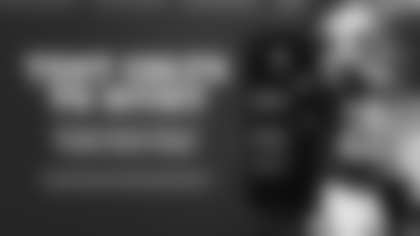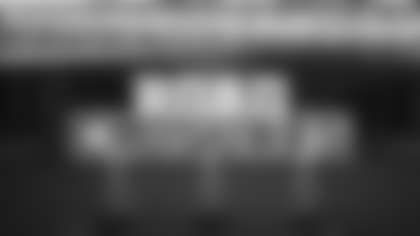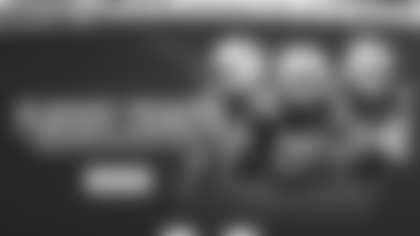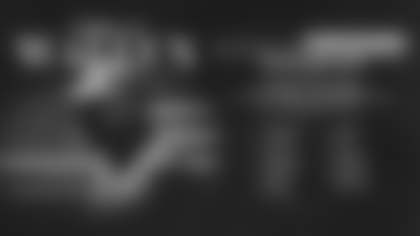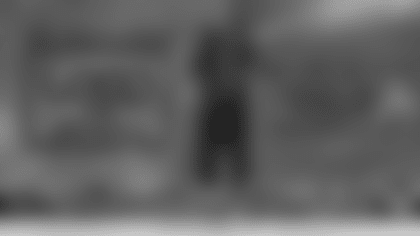Q: The Colts had a bye on Wild Card weekend and will play the
Baltimore Ravens in an AFC Divisional Playoff game at Lucas Oil
Stadium Saturday at 8:15 p.m. How much of Wild Card weekend did you
get a chance to watch?
A: I watched a lot of football over the weekend, and with more than a little passing interest. (Colts Head Coach) Jim Caldwell said Monday, 'Any of the three teams we might have faced essentially played the same style of football.' I don't think the preparation other than individual players would have been a whole heck of a lot different. That's the nature of football.
Q: With all three – the Jets, Bengals and Ravens – the key is stopping the run . . .
A: Obviously, turnovers were a big factor (in the weekend's game). The Jets got some turnovers (in a 24-14 victory over Cincinnati). Obviously, Baltimore got turnovers (in a 33-14 victory over New England), which created the kind of situation where it played into their style of play and into their hands. When you do that, they're going to be awfully tough to beat.
Q: Start with the Ravens. Anything surprise you?
A: I didn't think Baltimore would be able to run the ball as much as they did and beat the Pats, but in looking at the tape, (Patriots wide receiver) Wes Welker was not there and that made a huge difference – gigantic. Even though (wide receiver) Julian Edelman is a good player, when you have to play against sophisticated defenses such as the Ravens are, and you don't have the kind of chemistry and the kind of teamwork that Welker and (Patriots quarterback Tom) Brady have, it makes it awfully difficult. (Patriots wide receiver) Randy Moss was a non-factor from start to finish, so where are they going to go with the ball? It made it difficult, and that's why he (Brady) was standing back there patting the ball for as long as he was. On so many occasions, there were times when Baltimore rushed three and they (the Patriots) still could not complete a pass. That was a little bit surprising, but of course when they got off to the 17-0 lead – which probably should have been 24-0 if the Ravens had replayed the fumble issue – it was pretty obvious then they could do what they wanted. The Patriots, I thought, hung in pretty well on defense until the punches took their toll. The opening play was a big play. I don't think the Patriots got adjusted properly. (Ravens running back Ray) Rice hit it and away he went. They're a very good team. That's why they're here. In the playoffs, you're going to get contrasting styles. We played them before and it was a tough ballgame, and it will be equally tough now.
Q: Ray Rice looks very impressive . . .
A: He was not a lot different at Rutgers than he is now. He's as close to (former Dallas Cowboys running back) Emmitt Smith as I have seen, although he's faster on the watch. He has great ability to make you miss. He made (Patriots linebacker) Jerod Mayo miss in the hole Sunday – an incredible play. Mayo was on a run blitz designed to blow up Ray Rice. He was coming 100 miles per hour. Ray just gave him a juke, made him miss and took off for 83 yards. He has all-the-way speed. He has great balance, which all the great running backs have. He is compact and very strong. He can catch the ball. He's a complete back. He's a great back.
Q: And (Ravens running back) Willis McGahee is a solid change of pace . . .
A: McGahee is certainly a very capable back in the National Football League. Ray Rice is among the elite backs in the league along with (Jaguars running back Maurice) Jones-Drew and people of that nature.
Q: What did you see from Jets-Bengals?
A: The breaks early (for the Jets) certainly helped. (Bengals quarterback) Carson (Palmer) didn't have his best day. The receivers clearly did not have their best day. They didn't help him. Cincinnati's defense did a heck of a job, but in the end, Shonn Greene will wear you down. He also is the real article. He's going to wear you down and run through people. He's going to get every yard there is to get, and then about four more at the end of every run. The Jets were able to play their game and get some big plays from (tight end Dustin) Keller in the passing game because Cincinnati had to sell out to stop the run. The loss of two linebackers hurt, (Rashad) Jeanty going out on the first play of the game, and of course he was replacing an injured starter beforehand. Not a good day for the Bengals overall, and it played right into the Jets' game plan.
Q: Some people were surprised with Dallas-Philadelphia. A lot of people thought it would be close.
A: It didn't turn out that way because that's a match-up situation, clearly. It had nothing to do with turnovers. It's a clear match-up situation. Philadelphia has not been a good pass-protecting offensive line since their center (Jamaal Jackson) went out. They got some other people hurt there. It was a bad match up for them. (Eagles quarterback) Donovan McNabb cannot do his thing when he's pressured consistently. Their running game is limited because of a bad match-up – offensive line versus defensive line. Then, the Eagles have had oodles of injuries at linebacker and that allows the Cowboys to go ahead and blast away with those running backs. That one, is a tough match-up for Philadelphia.
Q: And what about Green Bay-Arizona – 96 points in a playoff game?
A: It's interesting when you look at the styles and the match-ups that occurred in the four games. In the Cincinnati-Jets game, you had a situation where Cincinnati was a bit undermanned. (Wide receiver Chad) Ocho(cinco) looked like he was not at full strength, and their receivers did not help Carson at all. What they could have done was throw the ball, but they didn't get much help doing it. The Jets were able to get on top early and go ahead and take control of the game. That really wasn't a match-up as much as it was one department not playing up to par – albeit both of their receivers are nicked. In the Philadelphia-Dallas game – match-up issue. In the New England-Baltimore game, a situation where the game got out of hand right away and without Wes Welker, the Patriots are not what they normally are. No question about that. In the Arizona-Green Bay game, you had a situation where both clubs play the exact same defense. It's a high-risk, high-reward defense. That's the way it turned out. They both knew what was coming, and they both took advantage of it. I've worked with both coordinators, Dom Capers (of the Packers) and Billy Davis (of the Cardinals). They're both great coaches, and they're both great guys. Both teams play the defense. They know the intricacies of it. They know the ins and outs of it. To make matters worse, they had played the week before, so they knew the personnel, so it was Katy Bar the Door. (Fox NFL analyst) Jimmy Johnson made a remark at halftime that I thought was right on target. He said, 'You rush average quarterbacks; you defend great quarterbacks.' They tried to defend (Cardinals quarterback) Kurt Warner. They just couldn't. And don't forget: (Cardinals wide receiver) Anquan Boldin was out of the game. It was a wild-and-woolly game. Much has been made of the two penalties that should have been called at the end, but in the heat of battle like that – I rarely defend officials – but in situations like that, where there is so much blitzing going on and there are so many guys coming at each other, you're not going to get them all.
Q: And it's not a reviewable call?
A: No, it's not reviewable. We did not want the game interrupted constantly by frivolous replay reviews, and there would be some that are frivolous. It's bad enough that the game is interrupted by replay in the last two minutes. The overwhelming majority of the Competition Committee did not want that. That was a compromise, but the rule is good where it is. Replay is basically designed to be possession catch-no catch and the lines. Did the ball break the plane? Did it get to be a first down? Was it in bounds or out of bounds? That's essentially what it does: possession of the ball and the lines, in broad, general terms.
Q: Is the Colts running game where you want it?
A: There are two ways to judge running. One is statistically, and statistically we were quite poor. I think we were 32nd in the league. The other is, 'How effectively did you run in the context of your offense and the way people are defensing you?' If you measure it on that second standard, we ran exceptionally well. We ran very well when we had to run. The only area we need to improve is four minutes, where we're trying to end games with the running game. That came back to haunt us in San Diego in the playoff game last year. We didn't do as good a job as we should have with it this year. That's something we continue to work on. We worked on it last week. Hopefully, we'll improve upon it during the playoffs.
Q: Backups Chad Simpson and Mike Hart have added something there, too, haven't they?
A: They both have. Both have the capability to be good players and to add to that running game. Chad, of course, had a kickoff return for a touchdown against Jacksonville and he'll be back there returning kickoffs in the playoffs. We have a good group there. The question is finding the right mix and blocking it get correctly.
Q: And a huge key in the running game is blitz pickup . . .
A: Absolutely. Our backs have to pick up blitzes. They're going to have to do that this coming week. That means you have to stand in there and take a lot of blows from big people coming at you 100 miles per hour. That takes its toll over the course of a ball game, which is why we use multiple running backs. It's hard to stay with one guy with all the blitzes that go on.
Q: What does an uncapped year mean for a small-market team such as the Colts?
A: I think it means very little in the larger scheme of things, if it's only one year. You essentially have two governors that would fall into place in a one-year situation. The first is the Final Eight rule, which of course applies to us. Any team that's in the Final Eight – which is any team that is playing this coming weekend – may not sign a free agent until they lose one. That's going to keep the eight best teams ostensibly out of the free-agent market unless one of their people leaves. It is not a release. It means that person is signed by another team as an unrestricted free agent. That's going to act as a governor. The other thing that's going to act as a governor is the so-called 30 percent rule, and that's too complicated to explain, but essentially it means that contracts may not increase anymore than 30 percent per year over what the player was paid this year. If those two governors were not there, I would worry greatly, because it would mean that essentially we would be baseball – that the big markets would have a gigantic advantage, that they could come in here and scoop up any talent that we had drafted and developed. I don't have to mention names. You know who the obvious people are. They would come in and scoop up the talent you drafted and developed, use it to win championships and you would be left being the Montreal Expos, the people developing the great major leaguers every year, like Pedro Martinez and Randy Johnson, and then having them move on when their initial contracts expire. That is not a prospect that I would look forward to. It's not a prospect that (Colts Owner and Chief Executive Officer) Jim Irsay looks forward to, and hopefully it is one that we don't ever reach. This uncapped year, because of the governors that are in place, will not have nearly the Draconian effect on competitive balance that it would if there were no governors in place.
Q: Any thoughts on what might happen on that front?
A: This is a total guess, but it's based on experience and basically reading smoke signals and tea leaves, how valuable that is or reliable that is remains to be seen, but I think we're going to be in an uncapped year. That's what my gut tells me. It's possible that in one more month we could reach agreement, but I don't think there is a high probability of that.
Q: How do you get rookies prepared for the postseason?
A: We work very hard to prepare them from the first day they arrive here. They are told in their first rookie orientation meeting that the three days of rookie camp will be the only time they are treated like rookies all year. We don't have any hazing. We don't have any special rookie regimen they go through. Basically, they're told from the time rookie camp ends in the first weekend in May that, 'From now on in, it's Next Man Up. If you make this team, you're expected to play at a high level and that the expectations here are very high.' Winning seasons are expected. Making the playoffs is a goal, but it's a goal that really is an expectation with this team. Going as far as you can go is a very big goal with this team. So, they're told to expect it. I think they expect to expect it. They get a taste of it during the season because of all of the high-profile games we play. The New England game (at Lucas Oil Stadium in November), for example, on Sunday night was an absolute playoff atmosphere both in the building and with the media attention and so forth. There are other games we played like that throughout the season. You hope that by the time they reach here they're finished with their rookie year, so now – as Jets Head Coach Rex Ryan said the other day – (quarterback) 'Mark Sanchez is no longer a rookie.' He's finished his rookie year. He's now a veteran and expected to play like one.
Q: The NFL-record seven fourth-quarter comebacks this season – how much does that help?
A: It helps a lot. They recognize you have to play 60 minutes. You're expected to play 60 minutes, and that's the way you win in this league. It takes them a while, almost half a season, to recognize the facts that this is a different game. (Wide receiver) Sam Giguere said it best after last week's game where there was nothing at stake except pride. I asked him, 'How did it go?' He said, 'Well, I felt OK in the kicking game,' and he did a great job returning kickoffs, but he said, 'When it came to playing from scrimmage, it was so much faster than I expected or had ever experienced that I was really at a little bit of a loss.' That's what Sam experienced. He was playing for the first time because he had been injured in minicamp. That's what they experience in preseason and certainly they experience it in the regular season. Now, it will be ratcheted up another notch in the playoffs, because every team is good. One of the benefits to playing our schedule – the so-called unbalanced schedule that we play; we play the No. 1 teams in every other division. We play those good teams during the course of the season. We will have played the Jets. We will have played Baltimore. We did not play San Diego this year, but that's a rarity. We have experience in those kinds of games, so we get that during the course of the year.
Q: What do you think of the new date for the Pro Bowl – a week before the Super Bowl? And will the six Colts players named to the game play if Indianapolis makes the Super Bowl?
A: No, they will not, if we're lucky enough to make it. The people who decided to have the Pro Bowl before the Super Bowl were league office people. It was discussed perfunctorily at an (NFL) Owners Meeting. I don't think many people focused upon it. It was discussed with the Competition Committee. The Competition Committee explained to the league office that you would not have the Super Bowl players and that would take some luster from the game, and that there was some likelihood that you would not have players from the championship games because they're so disheartened by losing. Virtually every player has an injury at this time of the year, so at least some of the players from the championship-game participants won't play in it. While the players will not participate, we were told of a decision that they are expected to be in Miami a day before their teammates to be introduced at the Pro Bowl and interviewed on television. That came as a shock and if we're fortunate enough to advance, we'll deal with it at the time. That's apparently how the league office has chosen to deal with the fact that the Super Bowl players will not play. But they will not play in the game – that's for certain.
Q: Who were your mentors in the NFL in terms of talent evaluation?
A: Marv Levy. He's responsible for virtually all of the success and all of the knowledge that I have of pro football. I was fortunate enough to work with him for the better part of 20 years. He gave me my start in professional football, and I'll be forever grateful to him. In addition to which, working here with Jim Irsay is largely responsible for the kind of success we've had, because you cannot have the kind of success we've had without support from ownership. I ran across a statistic Monday: from 1999-2009, which encompasses 11 seasons, we've won more games than anybody in the National Football League. You don't do that without a great staff – that's where it starts – but also with an owner who is absolutely committed to winning. Jim Irsay is committed to winning night, noon and morning. He has made incredible decisions and incredible sacrifices in order that this team may remain at an exceedingly high level. What I know about pro football, I learned mostly from Marv Levy. The ability to utilize that knowledge comes directly from Jim Irsay. I was very fortunate to work with some great people along the way – the great Whitey Dovell with the Chicago Blitz, who went on to become an extremely successful player personnel director with the Kansas City Chiefs. He put together Derrick Thomas and that group. Norm Pollom, with the Buffalo Bills when I came there as a pro scout – an extremely competent personnel man. John Butler and Bob Ferguson with the Buffalo Bills, and A.J. Smith with the Buffalo Bills, who went on to become general managers in this league. Then, of course, all of the wonderful people I've had the opportunity to work with here, the tops is Dom Anile. We were together 15 years in Carolina and here. Those are the guys who are responsible for actually going out there and pounding the pavement and doing the job and uncovering the players and in many cases, particularly in Dom's case, putting together the system that leads us to so many good players. The basic knowledge came from Marv. He still remains my mentor and my inspiration. I very often don't live up to his standards, but those standards are always there for me to try and meet. And Jim Irsay, who absolutely gives us everything we need, and more, to succeed.
Q: How many scouts do you have on staff now?
A: We have eight college scouts and Tom Telesco, our director (of player personnel), and (Vice President/General Manager) Chris (Polian) and three other pro scouts on the pro side of the business.
Q: Why wasn't the Tuck Rule called at the end of the Green Bay game Sunday?
A: I can't tell you about the Green Bay-Phoenix game because I did not see the play in slow motion. I didn't look at that tape Monday. I looked principally at Baltimore. I can tell you without question, because the Competition Committee went over and over and over the New England play (from the postseason following the 2001 season), that the Competition Committee was unanimous that we wanted to change that rule. Tom Brady brought the ball down and touched it with his other hand. It looked exactly like he had taken possession of the ball again before it was fumbled. The officiating department said, 'No. We can't officiate it that way.' That was the reason the rule wasn't changed. They believe it's impossible for them to officiate that way because the referee is removed from the quarterback. When the quarterback's arm goes forward, they want it to be a forward pass from there on in. There was a slight change – if the quarterback actually takes possession of the ball and brings it toward his body and then there's a fumble, they'll rule that a fumble. But what they're watching is his arm. Once his arm goes forward, they're going to call that a forward pass no matter what. It defies logic when you look at the Brady play, and of course, I'm sure (Raiders Owner Al) Davis will tell you until he takes his last breath that it was a fumble and it sure looks that way when you look at the tape, but the officiating department believes it's best to leave it as it is, and that's what we did.
Q: What can be done to prevent fumbles Saturday considering how much Ravens defenders seek to strip the ball?
A: We work on it in practice virtually every day. Our defensive backs work very hard against our receivers in trying to force fumbles, trying to force incompletions, trying to rake the ball out, trying to pull their arms away. It's not something we haven't seen before. Press coverage, which is what they played a great deal of Sunday, is not something we haven't seen before. We should be well-prepared for it. They execute very, very well and it's usually execution that wins in these kinds of situations, not so much Xs and Os or techniques. We'll be prepared for it, but they're a very, very good defensive team. No two ways about that.
Q: They're a tough team against which to win the turnover battle, aren't they?
A: The reason they are is because they take very few chances on offense. They pound the ball, and their running backs do a great job of protecting the ball. They do a terrific job of taking the ball away, led by (safety) Ed Reed, who gets interceptions because he seemingly flies out of nowhere. He's got the best ball sense and quarterback-reading instinct that I've seen since I've been in the league. He's outstanding at it. He's a guy you have to watch for at all times and even when you are, he'll make a play now and then. They're a very good defense. No question about it. He's coming toward the ball all the time. His ability to recognize where the ball is being thrown is uncanny.
Q: Are the Colts fully healthy entering the postseason?
A: I think so. (Left tackle) Charlie Johnson essentially has a toe injury that probably won't heal until well into the offseason, but he's able to go. It's a little bit better than it was. Most everybody has a nick or bang here and there, but they all seem to be back and ready to go. We'll be as healthy heading into this game maybe since the first ballgame of the season. No one's 100 percent at this stage of the season. Everyone has an injury. We refer to them as nicks, but guys play through them. In this particular case, everyone has a little hurt. In some cases, even bigger hurts. But they'll play through them and we should have everybody ready to go. No one should be held out of the game because of injury.
Q: Why do you play certain reserve defensive backs against starting receivers in the red zone?
A: The way we align our defensive backfield, whether it's in the red zone or anywhere else, is that essentially the nickel back is a starting corner who moves inside to play on the slot. That has been (rookie) Jerraud Powers when he's healthy. He is healthy again. We bring in (rookie wide receiver Jacob) Lacey as the third corner and he plays outside on a wide receiver. We don't try to match up so-called strength against strength because in many ways we're a zone-concept football team. Bottom line: it's the question of who can cover zones as well as possible, so the nickel back moves inside. When Marlin Jackson was healthy, he was the nickel back. He would be the third back entering the game. With Powers in there, because he has a real knack for playing it, Lacey comes in and he just replaces Powers at corner and (cornerback) Kelvin (Hayden) stays where he is. That's the way we do it. It's not a match-up situation. Had we to do it all over again, (defensive coordinator) Larry Coyer said he would have played Randy Moss in the slot very differently than we played him in the ballgame back in November. Had we met them in the playoffs, it would have been different.
Q: How important are the fans Saturday?
A: This is a collaborative effort here. All that is written and spoken about this game this week will mean absolutely nothing. The only people who will have an effect on the outcome of the game are the people in this building who are on the field – and the fans. The reason we worked so hard and sacrificed so much to get the home-field advantage is because of that. We need our fans behind us. They make this one of the toughest places in the National Football League to play. We need the 12th Man into it loud and proud and involved this coming Saturday.
Q: Any final thoughts on the Ravens?
A: They have (outside linebacker) Terrell Suggs back, who they did not have last time around. He's a great pass rusher. He allows them to do many more things in their package. They're very confusing along with being very, very physical and very smart. They give you problems picking things up. We traditionally have played low-scoring games with them. I wouldn't think this would be any different. They're a big, hard-nosed, tough, physical front. They will be the biggest test our offensive line has had to date. They're going to have the hat on them as the saying goes, and they're going to have to perform very well. If we can protect the passer and allow ourselves some running room, I think we have a better than even chance to win the game. If we don't, it will be a long afternoon – or evening, as the case may be.




